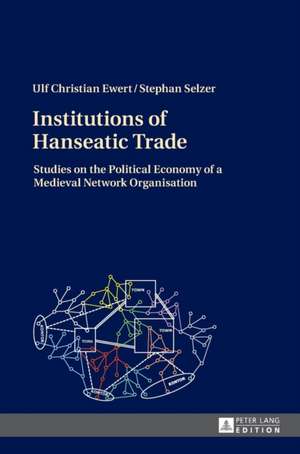Institutions of Hanseatic Trade
Autor Ulf Christian Ewerten Limba Engleză Hardback – 29 noi 2016
Preț: 531.39 lei
Nou
Puncte Express: 797
Preț estimativ în valută:
101.70€ • 105.78$ • 83.95£
101.70€ • 105.78$ • 83.95£
Carte tipărită la comandă
Livrare economică 14-28 aprilie
Preluare comenzi: 021 569.72.76
Specificații
ISBN-13: 9783631661833
ISBN-10: 3631661835
Pagini: 195
Dimensiuni: 156 x 215 x 19 mm
Greutate: 0.34 kg
Editura: Peter Lang Copyright AG
ISBN-10: 3631661835
Pagini: 195
Dimensiuni: 156 x 215 x 19 mm
Greutate: 0.34 kg
Editura: Peter Lang Copyright AG
Notă biografică
Ulf Christian Ewert is a Research Associate at the Cluster of Excellence `Religion and Politics¿ and lecturer in economic history at the University of Münster. He has taught medieval and economic history at Chemnitz University of Technology, Helmut-Schmidt-University Hamburg, Free University of Berlin and the universities of Munich, Halle and Regensburg. He published numerous articles on the Hanse, the Portuguese overseas expansion, the political economy of pre-modern princely courts and on early-modern living standards.
Stephan Selzer is Professor for medieval history at Helmut-Schmidt-University / University of the Federal Armed Forces Hamburg. He is the author of numerous publications on the social and economic history of the later Middle Ages as well as specialist literature on the medieval Hanseatic League and the communication and mobility of the Hanse area.
Descriere
Structure and coordination of the Hanse's network trade system are analysed in an institutional economics framework. Simplicity and flexibility of this medieval network organisation enabled Hansards to bridge existing gaps in the econcomic development of northern Europe, but also contributed to the later decline of Hanseatic trade after 1500.
